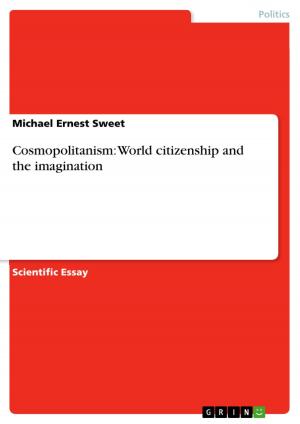A Contrastive Analysis of Politeness
Requests and Refusals in German and English
Nonfiction, Reference & Language, Language Arts, Linguistics| Author: | Juliane Behm | ISBN: | 9783640118571 |
| Publisher: | GRIN Publishing | Publication: | July 25, 2008 |
| Imprint: | GRIN Publishing | Language: | English |
| Author: | Juliane Behm |
| ISBN: | 9783640118571 |
| Publisher: | GRIN Publishing |
| Publication: | July 25, 2008 |
| Imprint: | GRIN Publishing |
| Language: | English |
Seminar paper from the year 2008 in the subject Speech Science / Linguistics, grade: 1,0, University of Rostock (Institut für Anglistik/Amerikanistik), course: Contrastive Linguistics - German and English, 18 entries in the bibliography, language: English, abstract: Social interaction, especially in the form of verbal communication, constitutes one of the most important parts of human life by influencing conversations between individuals and shaping their interpersonal relationships. During the development of civilized societies people have established norms and values describing socially appropriate behaviour as well as specific conversational strategies and linguistic formulae which are generally considered to be 'polite' in a particular culture and context. When being asked to judge a person as 'polite' almost everyone has his own concept of politeness in mind, ranging from showing good manners, such as allowing women to go ahead, to politely asking other people for a favour such as lending lecture notes, by using specific linguistic formulae. Therefore, politeness cannot only be shown in people's way of behaviour towards each other but particularly in the use of language and specific linguistic devices in speech acts like requests, refusals, apologies, thanking as well as greeting and parting. On the basis of a general understanding of polite behaviour people consider their fellow-beings as being either well-behaved and respectful or rude and ill-mannered in social interactions. However, people do not assess other people's behaviour in the same way since their individual understanding of politeness varies quite considerably. Depending on factors like the situation and their relationship with the conversational partner people evaluate polite behaviour differently from being socially appropriate, considerate, and respectful to even hypocritical and insincere when they feel that some people overdo their friendliness.
Seminar paper from the year 2008 in the subject Speech Science / Linguistics, grade: 1,0, University of Rostock (Institut für Anglistik/Amerikanistik), course: Contrastive Linguistics - German and English, 18 entries in the bibliography, language: English, abstract: Social interaction, especially in the form of verbal communication, constitutes one of the most important parts of human life by influencing conversations between individuals and shaping their interpersonal relationships. During the development of civilized societies people have established norms and values describing socially appropriate behaviour as well as specific conversational strategies and linguistic formulae which are generally considered to be 'polite' in a particular culture and context. When being asked to judge a person as 'polite' almost everyone has his own concept of politeness in mind, ranging from showing good manners, such as allowing women to go ahead, to politely asking other people for a favour such as lending lecture notes, by using specific linguistic formulae. Therefore, politeness cannot only be shown in people's way of behaviour towards each other but particularly in the use of language and specific linguistic devices in speech acts like requests, refusals, apologies, thanking as well as greeting and parting. On the basis of a general understanding of polite behaviour people consider their fellow-beings as being either well-behaved and respectful or rude and ill-mannered in social interactions. However, people do not assess other people's behaviour in the same way since their individual understanding of politeness varies quite considerably. Depending on factors like the situation and their relationship with the conversational partner people evaluate polite behaviour differently from being socially appropriate, considerate, and respectful to even hypocritical and insincere when they feel that some people overdo their friendliness.















